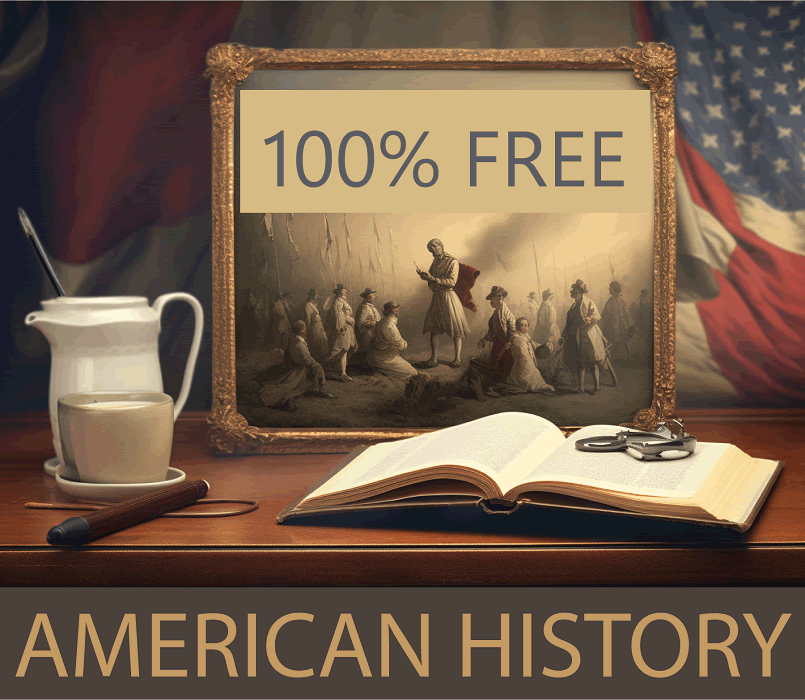| www.studenthandouts.com > American History |
|---|
| Unit 1: | Early America | |
| Unit 2: | Colonial Period | |
| Unit 3: | Road to Independence | |
| Unit 4: | Formation of a National Government | |
| Unit 5: | Westward Expansion and Regional Differences | |
| Unit 6: | National and Sectional Conflict | |
| Unit 7: | Civil War and Reconstruction | |
| Unit 8: | Growth and Transformation | |
| Unit 9: | Discontent and Reform | |
| Unit 10: | War, Prosperity, and Depression | |
| Unit 11: | New Deal and World War II | |
| Unit 12: | Postwar America | |
| Unit 13: | Decades of Change, 1960-1980 | |
| Unit 14: | New Conservatism and a New World Order | |
| Unit 15: | Bridge to the Twenty-first Century | |
| Unit 16: | Polarization and Deglobalization |
| Studying United States history is important for students for several compelling reasons. Understanding National Identity: Learning about the history of the United States helps students understand the nation's unique identity, values, and culture. It provides insight into what it means to be an American and how historical events have shaped this identity. Appreciating Historical Roots: Understanding U.S. history allows students to appreciate the historical roots of their country. They can trace the development of the nation from its founding to the present day and see how it has evolved over time.  Civic Engagement: Knowledge of U.S. history is essential for informed civic engagement. It equips students with the understanding they need to participate in the democratic process, make informed decisions, and contribute to their communities and the nation. Civic Engagement: Knowledge of U.S. history is essential for informed civic engagement. It equips students with the understanding they need to participate in the democratic process, make informed decisions, and contribute to their communities and the nation. Critical Thinking Skills: The study of history promotes critical thinking skills, such as analyzing primary sources, evaluating historical evidence, and forming well-reasoned arguments. These skills are valuable in various aspects of life, including problem-solving and decision-making. Global Context: U.S. history is intertwined with world history. Learning about U.S. history helps students understand the nation's role in global events, diplomacy, and conflicts. It fosters a global perspective and awareness of international relations. Appreciating Social Change: U.S. history provides a lens through which students can examine significant social changes, such as the abolition of slavery, the civil rights movement, and the women's suffrage movement. These movements have had a profound impact on social justice and equality. Learning from Past Mistakes: The study of history allows students to learn from past mistakes and avoid repeating them. It provides insights into the consequences of actions and decisions, encouraging responsible citizenship. Diverse Perspectives: U.S. history includes a diversity of experiences and perspectives, from Indigenous peoples and early settlers to immigrants and marginalized communities. Studying this history promotes an understanding of the country's rich diversity and multicultural heritage. Economic Understanding: U.S. history provides insights into economic developments, including industrialization, economic crises, and the evolution of capitalism. Understanding these economic forces is relevant to modern economic issues. Scientific and Technological Advancements: U.S. history includes significant advancements in science and technology, from the space race to medical breakthroughs. Learning about these achievements inspires an interest in STEM fields. Innovation and Entrepreneurship: U.S. history is marked by innovation, entrepreneurship, and the founding of influential companies and industries. Students can learn from the successes and failures of entrepreneurs and inventors. Preservation of Cultural Heritage: Studying U.S. history helps preserve the cultural heritage of the nation. It highlights the contributions of artists, writers, musicians, and cultural movements that have shaped American culture. Tackling Contemporary Issues: Many contemporary issues, such as racial disparities, immigration policy, and environmental concerns, have historical roots. Understanding this history is essential for addressing current challenges. Life-Long Learning: Knowledge of U.S. history provides a foundation for life-long learning and intellectual curiosity. It encourages individuals to explore the past and its relevance to the present and future. In sum, the study of United States history is essential for informed citizenship, cultural appreciation, critical thinking, and a deeper understanding of the nation's place in the world. It equips students with the knowledge and skills needed to engage with complex historical and contemporary issues, making it a vital component of education. |
|
|
|
| www.studenthandouts.com > American History |
|---|







